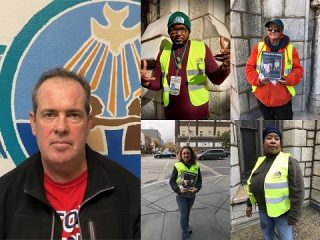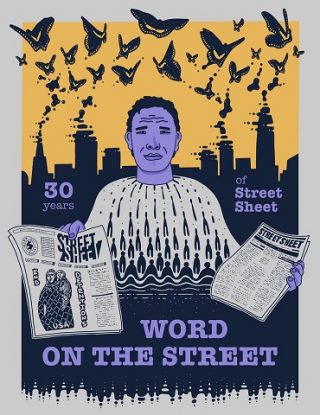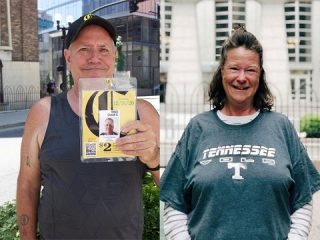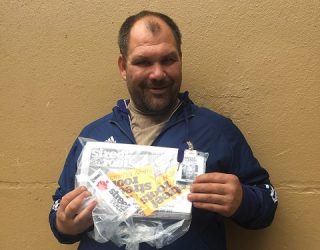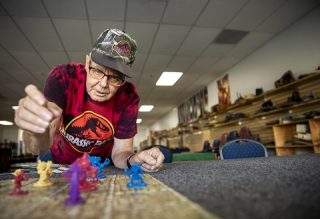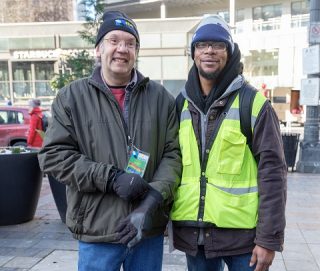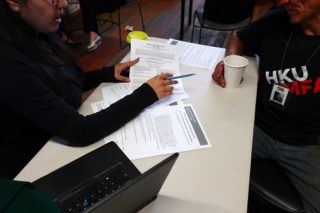#VendorLetters: Four diverse Real Change vendors write to their 25-year-old selves
To mark the end of INSP’s 25th anniversary year, we have been asking vendors across the street paper network to write a letter to their 25-year-old self. In this instalment, four Real Change vendors write about life at 25.
One Step Away #VendorLetters in their own handwriting
To mark the end of INSP’s 25th anniversary year, we have been asking vendors across the street paper network to write a letter to their 25-year-old self. This instalment in the series features One Step Away vendors, three of which submitted their letters in their handwritten form.
Life on the streets: Growing old
Portland’s Street Roots has a periodic column about the parts of homelessness most people don’t talk about. In the US, the proportion of elderly people experiencing poverty and homelessness has risen by more than 20 per cent in the past 15 years. For this instalment, Street Roots explores what being homeless is like for people in the later years of their lives.
Our vendors: Edward Johnson (One Step Away, Philadelphia, USA)
Edward Johnson has been working as a One Step Away vendor for over a year and moved into housing in August. Over 5,000 Philadelphians are affected by homelessness on any given night and, until recently, Edward was one of them. One Step Away finds out more about the sequence of events that led to Edward losing his home and hears about how One Step Away has given him support that he is richly grateful for.
Magic Hour: Curbside Chronicle vendors document golden moments through disposables
Vendors of The Curbside Chronicle documented their lives through a disposable camera photo essay with a magic hour theme for the Oklahoma street paper’s 55th issue, with some stunning results.
Street Sheet: Street paper network’s oldest member turns 30
San Francisco’s Street Sheet is the oldest current member of the International Network of Street Papers, and this month is celebrating its 30th anniversary. INSP spoke to the paper’s current editor Quiver Watts about the publication and the city, and hear excerpts from Street Sheet’s anniversary issue about the experiences of vendors and former staff over the years.
Health matters: Contributor vendors on getting healthcare in the US
Health care is a hot topic in the United States and the debate about health care is likely to be a key issue in the run up to the presidential election in 2020, and differing opinion on how it should be reformed has already been core to the ongoing Democratic Primary. The prohibitively high costs of accessing health care, combined with the high number of people without medical insurance, means that many Americans cannot access the care that they urgently need. Two vendors talk to The Contributor about their experiences of the American health care system.
The true horrors of homelessness
Previously, INSP brought stories from those living on the streets of Berkeley, published in the city’s street paper Street Spirit, that told tales of paranormal experiences, brushes with what could have been actual ghosts and, more eerily, the ghosts of memory. Here are two more pieces of writing, also by people who have experience of homelessness, which talk more about the truthful horrors that can occur while homeless.
Ghost stories from the homeless community
To coincide with Halloween, Berkeley, California’s Street Spirit asked those who lived on the city’s streets for chilling, ghostly stories intersecting with their experiences of homelessness.
Our vendors: Randy Humphreys (Street Roots, Portland, USA)
Randy Humphreys has been working as a Street Roots vendor for a few months and experiences great enjoyment in his work. He enjoys the contact that he has with his customers and is focusing on leaving his past behind him and moving forward with his life.
Our vendors: James Jenkins (Real Change, Seattle, USA)
James Jenkins sells Real Change from his pitch at the QFC grocery story on Broadway and Pike Street in Capitol Hill. Jenkins has Acute Disseminated Encephalomyelitis (ADEM), a rare neurological disorder that makes working nine-to-five unfeasible for him. He enjoys working as a Real Change vendor because it offers him the flexibility to work on the days that he feels well enough to do so.
Life on the Streets: Beating the heat
Summer may be over, but due to pollution, the trapping of heat in urban areas and global warming, the autumn months may not prove to be much cooler for people living on the streets. In a periodic column about the parts of homelessness most people don’t talk about, Street Roots vendors talk about the burden of living on the streets when the weather is hot.
Passion projects: Curbside Chronicle vendors on their hobbies
Curbside Chronicle vendors don’t just sell magazines. Although that’s probably what you’ll catch our green-vested sales force doing in public, it’s only one facet of their lives. Vendors love movies, sports and art just like anyone else. When vendors transition back into housing, it not only creates more opportunities for stability and comfort but also allows them to pursue their hobbies. From painting and drawing to tabletop gaming and leather work, here’s what some of our vendors do in their free time.
Real Change turns 25: Q&A with Founding Director Tim Harris
INSP turns 25 this year, but so do a number of our street paper members. Real Change in Seattle is just one of them. To mark it, the paper’s reporter Ashley Archibald spoke to its founding director Tim Harris about the past, present and future of the street paper movement.
Life on the Streets: Prone to loss
Portland’s Street Roots has a periodic column about the parts of homelessness most people don’t talk about. People in extreme poverty are experts on loss, whether it be their belongings, their privacy, their dignity or anything else.
Life on the Streets: The proliferation of private guards
Portland’s Street Roots has a periodic column about the parts of homelessness most people don’t talk about. Some Street Roots vendors welcome added security; others say private guards – who are not police – overstep their bounds.
Street papers respond to President Trump’s homelessness comments
Last week, US President Donald Trump made comments about homelessness that garnered some bewildered reactions. Homelessness is an issue rarely spoken on by Trump. But a community of people who know a thing or two about homelessness in the US are street paper staff and vendors. A selection of them, from Portland’s Street Roots and Washington, D.C.’s Street Sense, had their say.
Reflections from the 2019 Global Street Paper Summit by INSP board member, and Real Change founding director, Tim Harris
After attending the 2019 Global Street Paper Summit, INSP board member, and Real Change founding director, Tim Harris offered some reflections on the state of the street paper movement and what we have to look forward to in the future.
Surviving through trauma: Sara Kruzan on trafficking, her incarceration, freedom and activism
After being trafficked into sex slavery, and emotionally and physically abused for much of her childhood, Sara Kruzan killed her abuser and was sentenced to life without parole. After fighting for her release, Kruzan has dedicated her freedom to advocating for the rights of young children put in similarly impossible situations. She spoke to INSP as she addressed an audience in Edinburgh about her work.
Our vendors: Rooster Tinch (Toledo Streets, Toledo, USA)
In a twist on the long-running vendor profile feature, Claire McKenna tells us more about Toledo Streets vendor Rooster Tinch. Claire is a Toledo Streets vendor and program manager who has become close to Rooster since he started working as a vendor in early 2018. Here, she talks about how Rooster has become part of the Toledo Streets family and a valued and successful team member – and shares the maxims that he lives by.
Read Street Roots’ award-winning cultural feature: ‘She Shreds: Ripping up the rulebook on female guitarists’
Fabi Reyna is the editor of She Shreds, a groundbreaking magazine that is a revolutionary platform for female guitarists. Since being launched in 2013, the magazine has championed itself as being an inclusive space that celebrates female guitarists – a demographic that is often overlooked in the industry. Here, Reyna looks back on five years of success and contemplates what is in store in the magazine’s future. Last night at the 2019 INSP Awards, this piece won Best Cultural Feature. Now, you can read it in full.
Stress on the streets
All of us experience some degree of stress in our everyday lives. For those who are homeless, however, stress can be a debilitating and chronic issue. Street Roots talked to a number of individuals about their experiences of life on the streets and about the impact that stress has had on their lives. This is especially pertinent as delegates at this year’s ongoing Global Street Paper Summit talk about dealing with conflict and vendor welfare.
Read The Curbside Chronicle’s ‘Ghost Bikes’ feature named 2019 Special News Service Award winner
To mark the 2019 INSP Awards, we are diving into the INSP Archive to bring you the pieces crowned with editorial honours. Oklahoma City’s The Curbside Chronicle published its ‘Ghost Bikes’ photo essay last year during National Bike Month and is now the recipient of this year’s Special News Service Award.
Our vendors: Joseph Capozzi (Real Change, Seattle, USA)
Real Change vendor Joseph was delighted to find community, support and hope when he moved into the new shelter housed at Seattle’s King County Jail. The new shelter initially proved divisive, with some – including Real Change Founding Director Tim Harris – voicing concern about the optics of housing people experiencing homelessness in a jail. For Joseph, the shelter has been a much-needed sanctuary. He explains how staying at the shelter has changed his life for the better.
“You have to wait in line constantly”
Portland’s Street Roots has a periodic column about the parts of homelessness most people don’t talk about. Here, vendors talk about how they’re “spending a hell of a lot of time” waiting around.
Street Roots vendors and attorneys partner for expungement pilot
The homeless community has long been the target of police action and prosecution, often creating an insurmountable backlog of tickets and non-violent misdemeanors that can effectively shut people off from safe housing, education and jobs, and perpetuating cycles of poverty. Portland’s Street Roots partnered with other organisations on a project aimed at helping vendors attain a clean slate.
Our vendors: Brian Lane (Street Roots, Portland, USA)
Brian Lane credits his Lummi Tribe heritage with helping him to recover from a traumatic injury: he feels that the spirit of his tribal lineage gave him the ability to pull through. Now homeless and living with a disability, Brian has found something else that is helping him to navigate his way through life: Street Roots. His involvement with the magazine has brought growth, support and the possibility of moving forward.
What vendors eat
Helping readers get to know our vendors is a big motivator for putting together street papers. For this story, The Curbside Chronicle asked vendors to document a week’s worth of meals with a food diary, curious to know more about what vendors are eating. They photographed a single day of meals from several participants. The results were mixed — everything from multiple visits to soup kitchens to eating nothing at all. But one thing was clear, most vendors experience significant food insecurity. Hopefully this piece helps illustrate how poverty affects people and what they eat every day.





